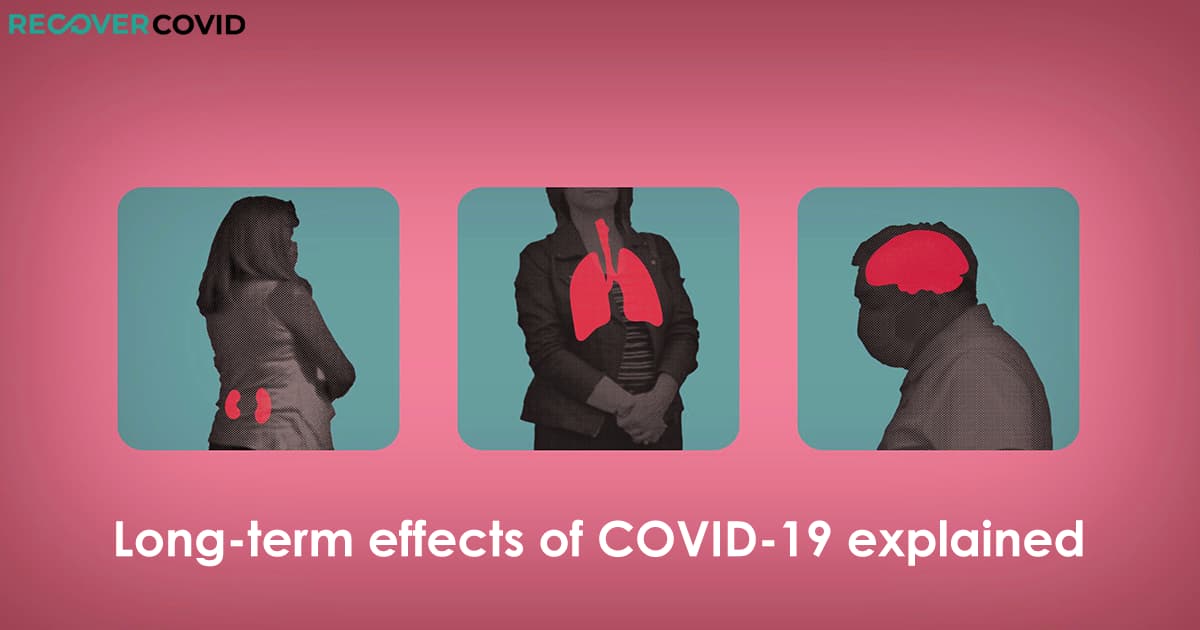Full guide to long term effects of Covid

COVID-19 can have long-lasting effects on physical and mental health even when individuals no longer show symptoms. The majority of individuals who contract COVID-19 recover after a few weeks. However, some individuals can continue to experience coronavirus symptoms long-term despite initially recovering from the virus. Individuals who suffer mild versions of coronavirus can also face long comebacks to total health. However, in some cases, they won’t ultimately return to complete health.
One of the scariest aspects of the COVID-19 pandemic is that it is an equal opportunity infectious disease. People in seemingly excellent health have been hit hard by the coronavirus, resulting in long-term problems and death.
Table of Contents
Who is at most risk for COVID-19 long-term health problems?
The most vulnerable people in terms of long-term health problems resulting from COVID-19 are older individuals and those with underlying health issues. Young people can also experience lingering symptoms. The research found that healthy people can feel unwell for long periods after the initial infection.
The most common COVID-19 symptoms experienced by individuals include:
- Tiredness and fatigue
- Difficulty breathing and shortness of breath
- Cough, often persistent and chesty
- Joint pain
- Chest pain
- Muscle pain
- Headache
- Pounding or rapid heartbeat
- Loss of smell
- Loss of taste
- Memory, concentration or sleep difficulties
- Rash
- Hair loss
Watch interesting video about the risk groups and how differentiate age groups for vaccination
Are there more serious long-term effects of COVID-19?
Individuals can experience even more serious long-term effects that target the organs. The lungs are often considered the primary organ affected by coronavirus as it is a respiratory disease. However, other organs can be impacted by the virus. Organ damage can cause long-term damage to a person’s health.
Organs that may be affected by COVID-19 include the heart, lungs, and brain.
- Heart – COVID-19 causes long-lasting issues to the heart, even if an individual suffers mild symptoms. Heart failure and other heart issues may occur in the future.
- Lungs – Pneumonia can develop in people suffering from COVID-19. Damage can be sustained by the alveoli, the tiny air sacs in the lungs. Scar tissue in the lungs from COVID-19 produced pneumonia can cause long-lasting breathing issues.
- Brain – Regardless of age, COVID-19 can cause strokes and seizures. The virus can cause Guillain-Barre syndrome, which causes temporary paralysis. Research suggests that sufferers may have an increased risk of developing Parkinson’s disease and Alzheimer’s disease.
Can blood clots and blood vessel issues develop?
Blood can become more susceptible to clotting. Heart attacks can result from large blood clots. Strokes can also develop from sizable blood clots. Clots to capillaries in the heart are believed to be the catalyst to damage to the muscle.
The lungs, legs, kidneys, and liver are also potentially at risk. Blood vessels can also be weakened. The weakened blood vessels can leak, resulting in long-lasting liver and kidney issues.
In the informative video below, Dr Seheult explains how Covid can affect blood vessels and create blood colts
COVID-19’s effect on fatigue and mood
Mental health issues can stem from COVID-19. Depression, anxiety, and post-traumatic stress syndrome can result from heavy-duty bouts of infectious disease. Individuals admitted to the hospital with severe symptoms are put on ventilators to help them breathe. Such an experience can lead to mental health issues, leaving individuals suffering for some time.
Coronavirus is part of the SARS (severe acute respiratory syndrome) virus family. Therefore, doctors and scientists have studied SARS to predict other issues that may occur once individuals recover. Long-term chronic fatigue syndrome may be a lasting effect of COVID-19. Chronic fatigue syndrome is a disorder that causes extreme fatigue and increases mental and physical activity. Unfortunately, chronic fatigue syndrome doesn’t get better with more rest.
Are there additional long-term COVID-19 effects?
Unfortunately, there are potentially more long-term COVID-19 effects. A lot is still unknown about COVID-19. It is a new infectious disease and has spread around the world with a ferocity never before seen. Doctors are being told to monitor patients closely who are suffering from COVID-19 to observe their organ functions following recovery.
Specialized clinics are being opened worldwide to provide care to people with common symptoms or illnesses related to the virus following coronavirus recovery—the majority of people who contract coronavirus recover in a short time span. The potential for long-term health problems from coronavirus is high. The possibility for life-altering problems after recovery makes the importance of reducing the spread of the disease paramount.
How to reduce the spread of COVID-19
Since the start of the COVID-19 pandemic, research has continued to be done to determine ways to prevent the spread of the disease. As a result, individuals can take steps to lower their chances of contracting the virus. Some of the steps individuals can take to reduce their chances – and others – of getting coronavirus include:
- Handwashing: One of the easiest ways to prevent the spread of germs is to wash hands regularly. Individuals should wash their hands for 20 seconds with plenty of soap and water. Hand sanitiser can be used as a substitute for soap and water until the hands can be washed properly.
- Avoid face touching: Germs can be spread quickly by touching the face. By avoiding the mouth, nose, and eyes with the hands, the spread of germs can be lessened. The hands touch items throughout the day, resulting in germs being spread.
- Reduce contact with others: By reducing the contact a person has with other people, the likelihood of spreading COVID-19 can be decreased. Individuals can carry COVID-19 and not show symptoms. Regular contact with people simply increases the chances of contracting the virus.
- Facemasks: Although many people criticize facemasks and claim they do not reduce the spread of coronavirus. If individuals use facemasks correctly, they can help people stay COVID-19 free.
World Health Organization published mini-educational video on how to prevent spread of Covid-19 virus
COVID-19 can cause a variety of long-term effects on individuals who suffer from the virus. Individuals can experience long-lasting problems. Health issues can result, making life difficult. Physical health issues are not the only problems a person can experience. Mental health issues such as PTSD, depression and anxiety can also occur. However, there are ways to reduce the spread of COVID-19, allowing individuals to live virus free.
Which organs are most affected by COVID-19?
As covid-19 has not yet been isolated, an exact list of affected organs is impossible. However, the eyes and respiratory system are especially vulnerable in several cases. While there are still many uncertainties surrounding this infection, it can be safely assumed that every organ is at risk, with the exception of the bones. The CDC’s Genetic Disease Research Office has determined that all currently recorded cases of covid-19 originated in New York. A single patient likely contracted the virus from an unknown source before hospitalization for other symptoms. Still, no one else reported contracting the disease before being admitted to a local medical center



